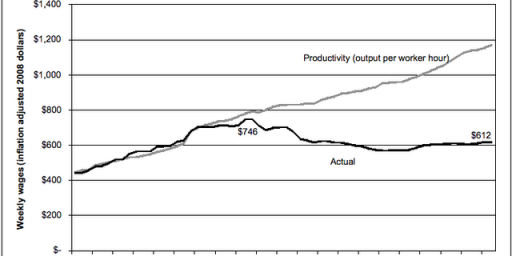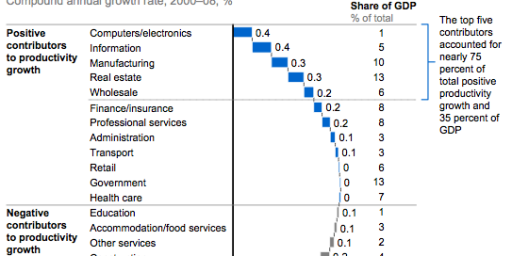Service Offshoring and Productivity
Some new research at the NBER points towards service offshoring having positive effect on U.S. manufacturing productivity.
Amiti and Shang-Jin find that from 1992 to 2000, “service offshoring” accounted for around 11 percent of the productivity growth in U.S. manufacturing industries compared to the 3 to 6 percent gain attributable to imported material inputs.” Their analysis is the first comprehensive study to find a link between service offshoring and productivity. “Sourcing service outputs from abroad by U.S. firms is growing rapidly,” they observe. “Although the level of service offshoring is still low compared to material offshoring, this business practice is expected to grow as new technologies make it possible to access cheaper foreign labor and different skills.”
As for the significant effect on productivity, the authors observe, outsourcing in general — whether it involves material goods or services — can usher in new levels of efficiency. But, they view purchasing services from abroad as offering the greatest potential for gain. “When firms decide to outsource materials or services to overseas locations they relocate the less efficient parts of their production stage, so average productivity increases,” they write. “The remaining workers may become more efficient if offshoring makes it possible for firms to restructure in a way that pushes out the technology frontier. This is more likely to arise from offshoring service inputs, such as computing and information, rather than offshoring material inputs.”
Don’t tell Lou Dobbs.
Snarkiness aside, this is an interesting result. I wonder home much of the increase is due simply to removing the least productive aspects of production stage and how much is due to changes in the firms technology frontier.






I do not have access to the paper, but I wonder how the they got around the data problems. When a firm offshores a good it enters the US through a port and is recorded in the trade data so we can subtract it from consumption to get output or GDP. But if a service is offshored it will just show up in the home firms computer one morning –back office operations for example — and generally is not recorded in the official data so it can not be subtracted from consumption to get a true estimate of production.